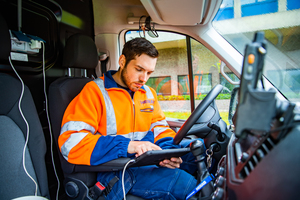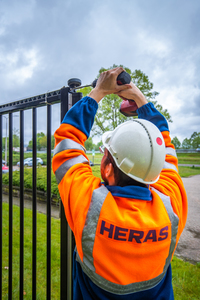

|
Edward Lowton
Editor |


|
| Home> | Premises management/maintenance | >Doors and curtains | >Maintenance: the unsung hero of effective premises management |
Maintenance: the unsung hero of effective premises management
07 December 2022
Servicing and maintenance can often be a long way down the list of sites' premises management priorities, however there are three reasons why they should be at the top, says Oliver Cook

LET'S ADDRESS the elephant in the room. For some site owners and operators, the annual servicing and maintenance of, say, sliding or automatic gates at the entrance of a busy industrial plant site will be seen as an unnecessary additional cost for equipment that, on the face of it, has very few working parts that can go wrong. And if there is a breakdown, then there are companies that they will call out to fix the problem.
In such cases, I always ask one simple rhetorical question: 'You wouldn't buy a new car and not service it for years, would you?'
We all know that a vehicle that is driven regularly and not serviced is far more likely to start underperforming and could eventually break down. It's the same for traffic barriers, automatic gates and other perimeter systems that are key to keeping any industrial plant site secure.
A lack of servicing and maintenance impacts businesses in three main ways:
1. A false economy
The first and most obvious one to highlight is that not having a servicing and maintenance contract may save a business money in the short term, but it’s a triple whammy of a false economy in the long run. Bills are typically higher if something does break down, businesses go to the back of the queue for call-outs and the lifetime of the product is reduced.
2. Business disruption
The knock-on effect from the point about a false economy is the cost of downtime to a business if automatic gates or traffic barriers break down and vehicles cannot enter a site – as a business will typically grind to a halt almost immediately.
There are some business sectors that simply cannot afford to have any downtime caused by a breakdown. The most obvious example is the food distribution hubs for the UK's supermarkets. Their logistics are hugely complex operations and rely on everything running like clockwork.
3. Compliance with current standards
The third and final reason is the least obvious but potentially the one that can have the biggest impact on a site’s day-to-day operations, as any business whose gates, barriers or turnstiles are not compliant with current standards is leaving itself wide open should incidents or accidents occur on the site that lead to damage, injury or worse.
We can’t stress enough the importance of compliance with current standards and regulations, such as the Supply of Machinery (Safety) Regulations 2008. These regulations implement Directive 2006/42/EC in the UK. This framework is all about the safety of machinery, and it provides the requirements that products must comply with. The potential for machinery to create hazardous situations must be minimised or, even better, eliminated.
And, as the UK has now left the EU, next year will see the UKCA (UK Conformity Assessed) mark supersede the CE mark as the UK product marking that is used for goods being placed on the market in Great Britain.
Time, money and compliance
Saving time, saving money and staying on the right side of the law are three compelling reasons for any busy industrial plant to heed the maintenance message.
And to make servicing and maintenance hassle-free, Heras has Connect, a cloud-based portal that offers real-time insights into the status of an entrance control system, with remote monitoring of user access and automatic alerts and notifications via smartphone, tablet or PC. It also enables users to open access systems via mobile phone, as well as enables Heras to provide remote and proactive monitoring of the systems
Oliver Cook is UK service sales manager at Heras
For more information:
Tel: 0808 164 2250




















